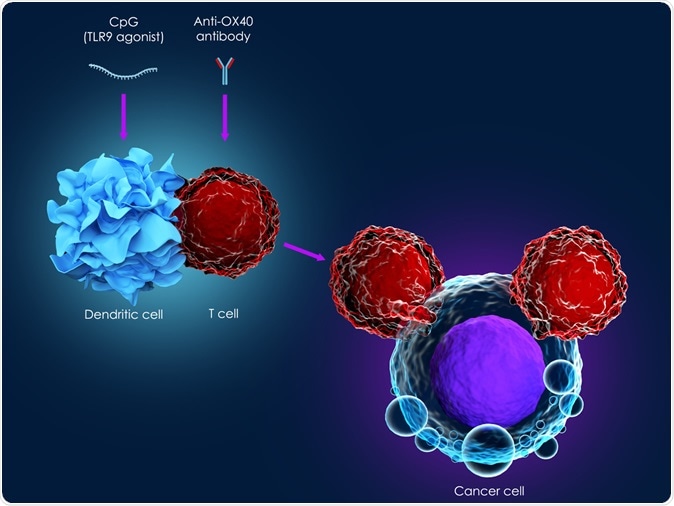Immunotherapy when used for cancer treatment could extend life longer finds studies. Experts have explained that until now immunotherapy was reserved as a last resort for most patients and treatment usually comprised of chemotherapy and radiation therapy failing which these were tried. In a pair of clinical trials, researchers have found that using immunotherapy as first line treatment can extend lives of these cancer patients.
Immunotherapies work by altering or reprogramming the immune systems of the body so that it recognizes the cancer cells and attacks and kills the tumour cells. Usually patients are offered immunotherapies when aggressive chemotherapies have failed. These trials have shown that in treatment resistant cancers, use of immunotherapy from the start not only increased survival but also had fewer side effects.
More studies are probably needed before these experimental treatments are made mainstay in cancer patients. However, risk benefit analysis might help decide the best options for these patients. These findings were all presented at the European Society for Medical Oncology Congress in Berlin.

3d illustration of cancer immunotherapy using CpG combined with anti-OX40 antibody. Image Credit: Meletios Verras / Shutterstock
Study 1
The first study was conducted by the Institute of Cancer Research and Royal Marsden NHS Foundation Trust. This study looked at immunotherapy drug pembrolizumab in around 900 patients suffering from advanced head and neck cancers. In most of these patients the disease was treatment resistant and advanced.
Results showed that pembrolizumab increased life expectancy by 40 per cent compared to regular chemotherapy. Median life expectancy was around 15 months with immunotherapy compared with chemotherapy (11 months). Further 17 percent of those on immunotherapy experienced side effects compared to 69 per cent on extreme chemotherapy.
The negative side of immunotherapy use was that only 23 per cent of patients responded to pembrolizumab compared to 36 per cent who responded to chemotherapy. However in patients who responded, the results were “unbelievable” say the researchers. Professor Kevin Harrington, who led the study said, “We couldn’t believe it when we saw the results. None of us expected pembrolizumab on its own to work so well in some of these patients – and it raises the prospect that we could spare some people chemotherapy altogether.” He said that there are future implications of this study. “The trial is still ongoing, but we expect some patients to go on to live for years longer than they would have done had they received standard chemotherapy,” he explained.
Study 2
The second study looked at the use of nivolumab in advanced colorectal cancer.
Researchers from University of Southern California explained that in 4 percent colorectal cancer patients the tumours carry a mutation that can affect DNA repair and these patients survive between 14-19 months on an average after treatment. The average survival for other types of colorectal cancers is around 25 months.
Immunotherapy agent nivolumab use showed that in 84 per cent of patients there was at least some shrinkage of the tumours. At the end of 12 months after this therapy, 77 per cent were alive with no progression in their tumours.
According to Professor Paul Workman, chief executive of the Institute of Cancer Research, these studies show that immunotherapy agents could have the potential to be “smarter, kinder and more effective first-line treatment”. He added, “We now need to do two things to ensure more patients can benefit from immunotherapy – develop ways of getting these drugs to work in a higher proportion of patients, and come to an agreement over the cost of these drugs to make them more affordable for the NHS.”